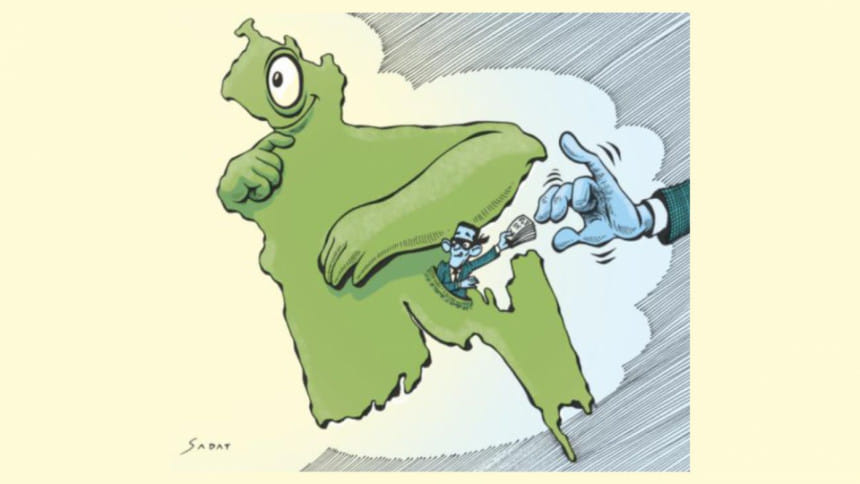Checking capital flight before it is too late

In a recently published report by the Washington-based research institute Global Financial Integrity (GFI), Bangladesh has been ranked second in South Asia in terms of illicit outflows of money. Around USD 5.9 billion was siphoned out of Bangladesh in 2015 through trade misinvoicing (The Daily Star, Jan 29, 2019). Another report, by the Swiss National Bank, shows that money parked by Bangladeshis in Swiss banks totalled around Tk 4,091 crore or 481 million as of 2017. Sadly, all this information was revealed at a time when Bangladesh has been desperately trying to attract local and foreign investment.
Capital flight takes two forms—legal and illegal. Legal capital flight is recorded on the books of the entity or individual making the transfer, and earnings from interest, dividends and realised capital gains normally return to the country of origin. On the other hand, illegal capital flight, also known as illicit financial flows (IFFs) is quite different—it consists of money earned illegally, accumulated in secretly and then transferred for use elsewhere. This money rarely returns to the country of origin. The money is usually generated from criminal activities, corruption, tax evasion, graft and smuggling. Furthermore, it is improperly documented, which means that it disappears from the records in the country of its origin. In economic literature capital flight is generally portrayed as the illegal transfer of funds from less developed nations to more advanced nations and it is also related with tax evasion, money laundering and black money.
There could be several reasons behind capital flight. It can occur when firms or individuals speculate on the prospect of earning a higher return abroad or when they fear currency devaluation, political turmoil, high rates of inflation, a poor domestic investment climate, etc. But the main reasons behind capital flight from Bangladesh are economic crimes. This year, the GFI detected the illicit financial flows (IFFs) by analysing trade misinvoicing. Trade misinvoicing is a method for moving money illicitly across borders that involves the deliberate falsification of the value of imports or exports, in order to evade customs duties and VAT, and hide those in offshore locations.
Then there is another form of capital flight usually done by some multinational companies that evade taxes through misuse of a mechanism, known as "transfer pricing". Transfer price is the price at which divisions of a company transact with each other for goods or services. It takes place when two related companies—such as a parent company and a subsidiary, or two subsidiaries controlled by a common parent—engage in international trade with each other for goods and services. Sometimes, related entities of a multinational firm show artificially high prices for an imported product or service in an attempt to deflate profits to evade taxes. This practice is known as "transfer mis-pricing". In its previous report, the GFI said Bangladesh lost USD 75 billion due to trade misinvoicing and other unrecorded outflows between 2005 and 2014. It means the country lost around USD 7 billion a year in capital during this period, causing the tax authority to lose a huge amount of revenue. The costs of this financial haemorrhage have been significant for Bangladesh as it has heightened income inequality and jeopardised employment prospects. In 2013 alone, the country witnessed illegal flight of capital to the tune of USD 9.66 billion. To put matters into perspective, the figure is three times the amount of foreign direct investment (FDI) Bangladesh has received in the last so many years.
Flight of capital is not a new phenomenon in our country. Since independence, corrupt politicians and politically-blessed businessmen, who amassed wealth through various forms of corruption and illicit deals like drug trafficking, weapons trading, extortion, bribe, commissions and kickbacks from foreign aid and loans intended to build the country's infrastructure and also wealthy people who have felt uncomfortable with our politics and political situation or those who are scared of keeping their money in Bangladesh, believing that their money will be safer abroad, have moved their wealth and invested somewhere else. In the early 1970s, investments were made in the United Kingdom, the United States and now the "second homes" in Malaysia or "Begum Para" in Toronto, Canada are emerging from such wealth.
A New York-based research firm Wealth-X recently released a report titled World Ultra Wealth Report 2018 which says that the number of rich individuals in Bangladesh is rising faster than anywhere in the world. Bangladesh has topped the list of countries that saw the quickest growth in the number of ultra-wealthy people between 2012 and 2017 and the number of ultra-high net worth (UHNW) individuals in Bangladesh rose by 17.3 percent during the period. The Wealth-X defines those with wealth above USD 30 million in net worth as the UHNW population. Interestingly, in the past few years we have noticed a growing number of loan scams and mismanagement that have plagued the banking sector. According to a report of the Centre for Policy Dialogue (CPD), a total of Tk 22,502 crore has been plundered from the country's banking sector through major scams, irregularities and heists in the last one decade. As of September 2018, non-performing loans (NPLs) totalled Tk 99,370 crore, which accounted for 11.45 percent of the total outstanding loans, according to Bangladesh Bank data. Experts say most of the default loans will not be returned as the money is actually being trafficked abroad.
What is worrying is that, if not checked, capital flight can create a bandwagon effect. In a country like ours, where the wealth of the nation is actually distributed among a small group of rich people, if a good portion of them shift their wealth and business to some other country, can we imagine the impact it would have in our economy? Businesses and factories can shut down creating huge unemployment; law and order will deteriorate; the real-estate sector will surely take a hit; demand for foreign currency will go up, which can cause the domestic currency to fall in value, which in turn can lead to tremendous instability and harm to the entire economy. The writing is on the wall. Therefore, before things become uncontrollable and the country goes into a deep crisis, the sticky issue of graft has to be tackled head on. The government should adopt and fully implement all anti-money laundering recommendations of the Financial Action Task Force and the laws already in place should be strongly enforced.
Abu Afsarul Haider studied economics and business administration at the Illinois State University, USA, and is currently involved in international trade in Dhaka. Email: [email protected]





Comments